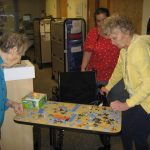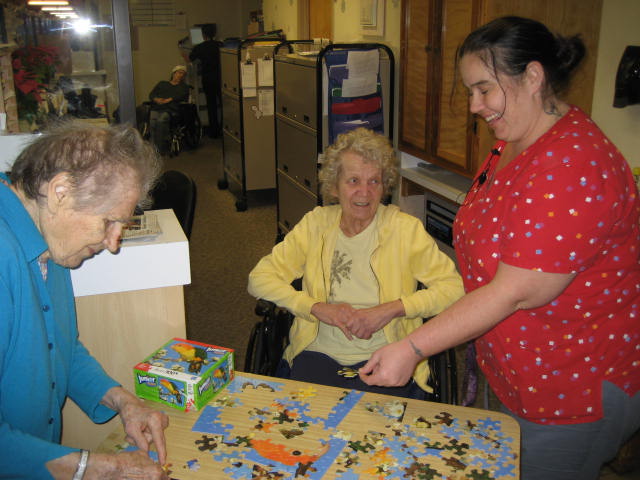 Helen is a long-term care resident at Northbrook Healthcare Center. Initially when she was admitted, staff was having difficulty caring for Helen because of her cognition, and she was sometimes combative and anxious. When we started implementing the Abilities Care Approach to Dementia, she was one of the initial six residents enrolled in the program. Occupational Therapy identified her Allen Cognitive Level, and with the support of Social Services, we obtained her Life History Profile during an interview with Helen’s daughter, enabling us to better understand her habits, preferences and long-term memories.
Helen is a long-term care resident at Northbrook Healthcare Center. Initially when she was admitted, staff was having difficulty caring for Helen because of her cognition, and she was sometimes combative and anxious. When we started implementing the Abilities Care Approach to Dementia, she was one of the initial six residents enrolled in the program. Occupational Therapy identified her Allen Cognitive Level, and with the support of Social Services, we obtained her Life History Profile during an interview with Helen’s daughter, enabling us to better understand her habits, preferences and long-term memories.
By integrating what we knew from her Allen Cognitive Level and the individualized information we obtained from her life profile, we were able to train staff on how to communicate and support Helen to avoid her becoming agitated during care. Puzzles and flower arrangements were identified during the family interview as areas of past interest and skill. The therapist also identified that due to her cognitive challenges and her personality profile, large group settings were difficult for Helen, and that she had a higher quality of engagement in activities if she was by herself.
One day, Helen’s behavior had escalated, and staff wondered what happened. We thought she might be experiencing a change of condition. Upon further observation, we identified that Helen had a change in her routine related to her roommate discharging from the facility. Helen was finding it difficult to cope with this change. Having identified the situation, staff was able to use information from the Life History Profile to calm Helen and help her feel safe, preventing a potential episode of further agitation.
This situation illustrates how important it is that we not only identify the physical and cognitive functioning of our patients, but also understand them as people — what makes them happy and what makes them sad. Understanding the emotional and social component during our interventions can help us effectively approach an individual, thereby helping us to be effective clinicians. We deal with different emotions every day, whether it is happiness due to a goal being met, or sadness due to temporary loss of function or pain. These emotions are expressed by our patients, ourselves and our coworkers. Being equipped with the understanding of not only our patients’ needs, but also our own needs makes us better clinicians and much better people.
Included with this article are pictures of Helen (wearing the yellow jacket) completing her puzzles at the nurse’s station during her period of agitation. Staff was able to decrease the agitation by providing meaningful activities (adapted to meet her Best Ability to Function) that reminded Helen of the person she has always been. By engaging in a familiar task at which she could be successful, Helen gained the confidence to socialize and even got some other residents and staff to help her with the puzzles.
By JB Chua, DOR, Northbrook Healthcare Center, Willits, CA

